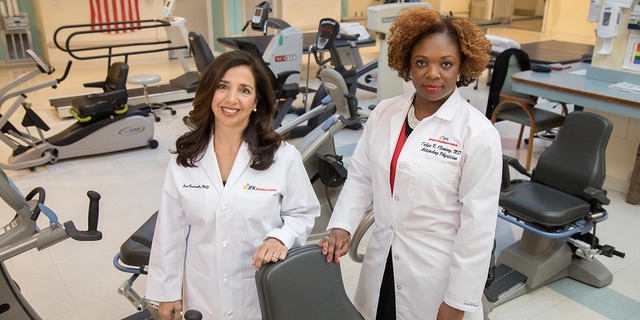Trials Proving the Importance of Comprehensive Cardiovascular Rehabilitation for Stroke Patients
Research at JFK Johnson Rehabilitation Institute is Reshaping the Future of Stroke Recovery
“When can we have a program like this instituted at our organization?” That’s what people at conferences all over the nation are asking after hearing the preliminary results of the JFK Johnson Stroke Recovery Program Trials.

The research began in 2015 and has enrolled over 250 participants. In the study group, stroke patients take part in 36 sessions of medically monitored interval cardiovascular training—as well as follow-up visits with a physical medicine and rehabilitation physician, psychological, nutritional, educational support and risk factor management. This is in addition to traditional physical, occupational and speech therapy.
In contrast, patients in the control group receive the traditional standard of care, which includes physical, occupational and speech therapy, and follow-up with their community physician.
“We are trying to prove, in a data-driven way, that stroke patients would benefit from a comprehensive program similar to what cardiac patients receive by participating in the CMS-funded Cardiac rehabilitation program,” says Dr. Sara J. Cuccurullo, Vice President and Medical Director of JFK Johnson and a co-principal investigator of the study. “We hope to raise the standard of care and advance the research to help stroke patients everywhere.”
So far, the results are creating a lot of excitement.
“The ongoing data continue to reinforce our preliminary findings and the importance of comprehensive rehabilitation after stroke, including 36 sessions of Cardiovascular conditioning. The results have been very impressive,” says Dr. Talya K. Fleming, Medical Director of the Aftercare and Stroke Recovery Program (SRP) at JFK Johnson and a co-principal investigator of the study. “Each day, we hear how this program is changing the lives of stroke survivors and their families.”
One-year, post-stroke follow-up has revealed a significantly lower unadjusted mortality rate in the patients who have gone through the Stroke Recovery Program as compared to the average unadjusted mortality rate for the typical stroke patient. The typical stroke patient has a 31% risk of all-cause mortality from hospital admission to one-year post-stroke, according to the Get With The Guidelines®-Stroke hospitals. The SRP participants have an all-cause mortality of 1.47%.
In the sub-group matched pair analysis, the nonparticipants had a 9.09 times higher hazard of mortality as compared to the SRP participants.

